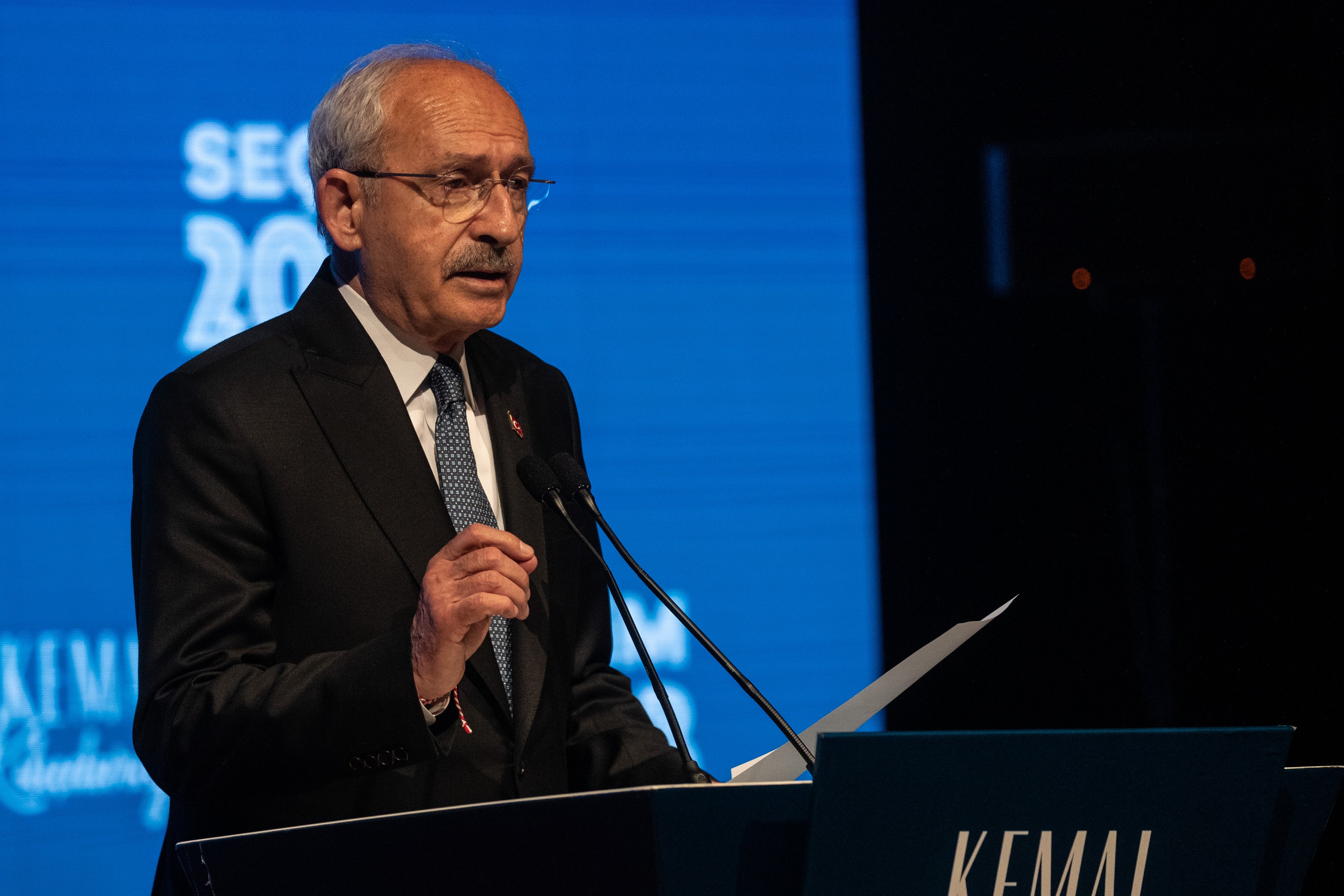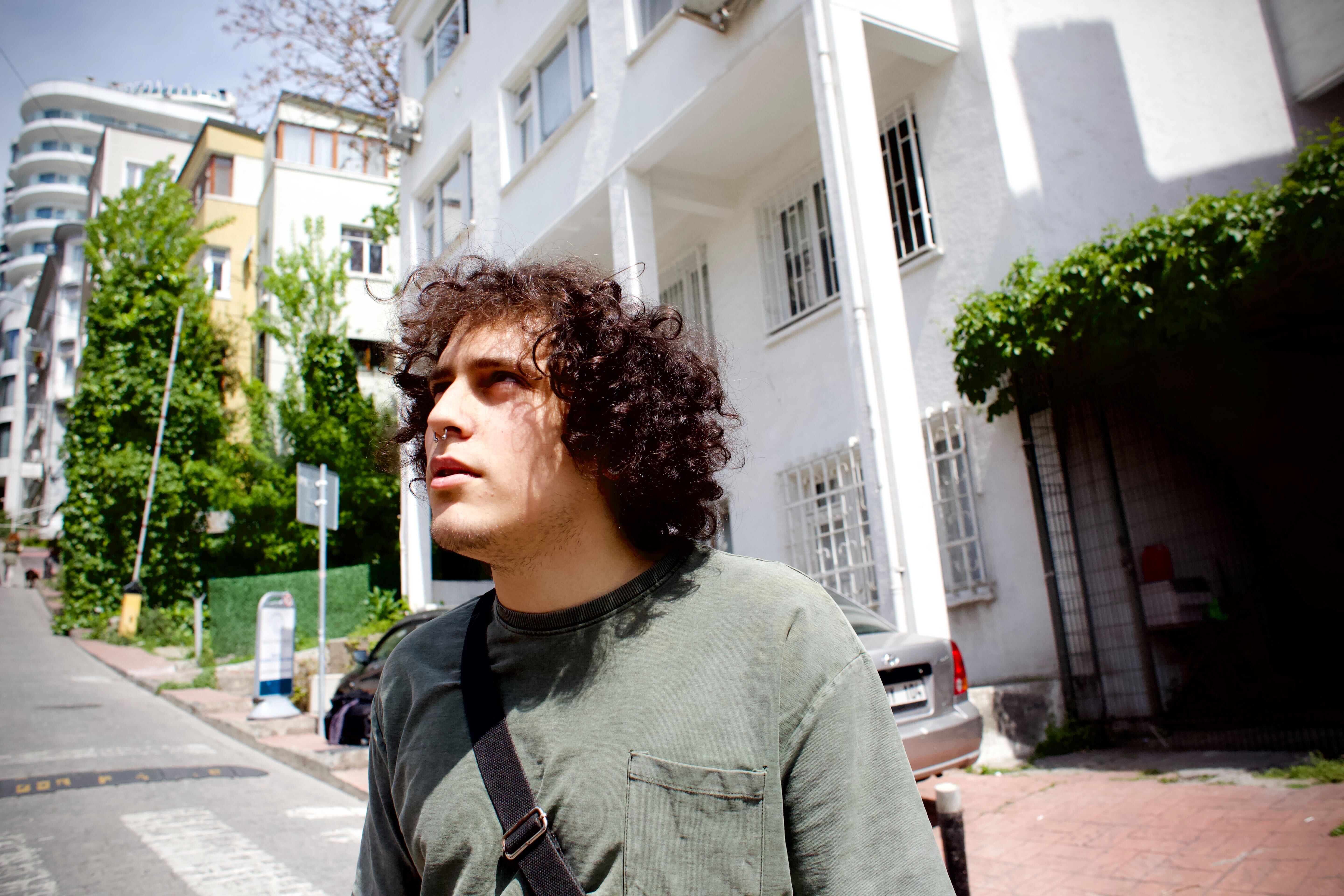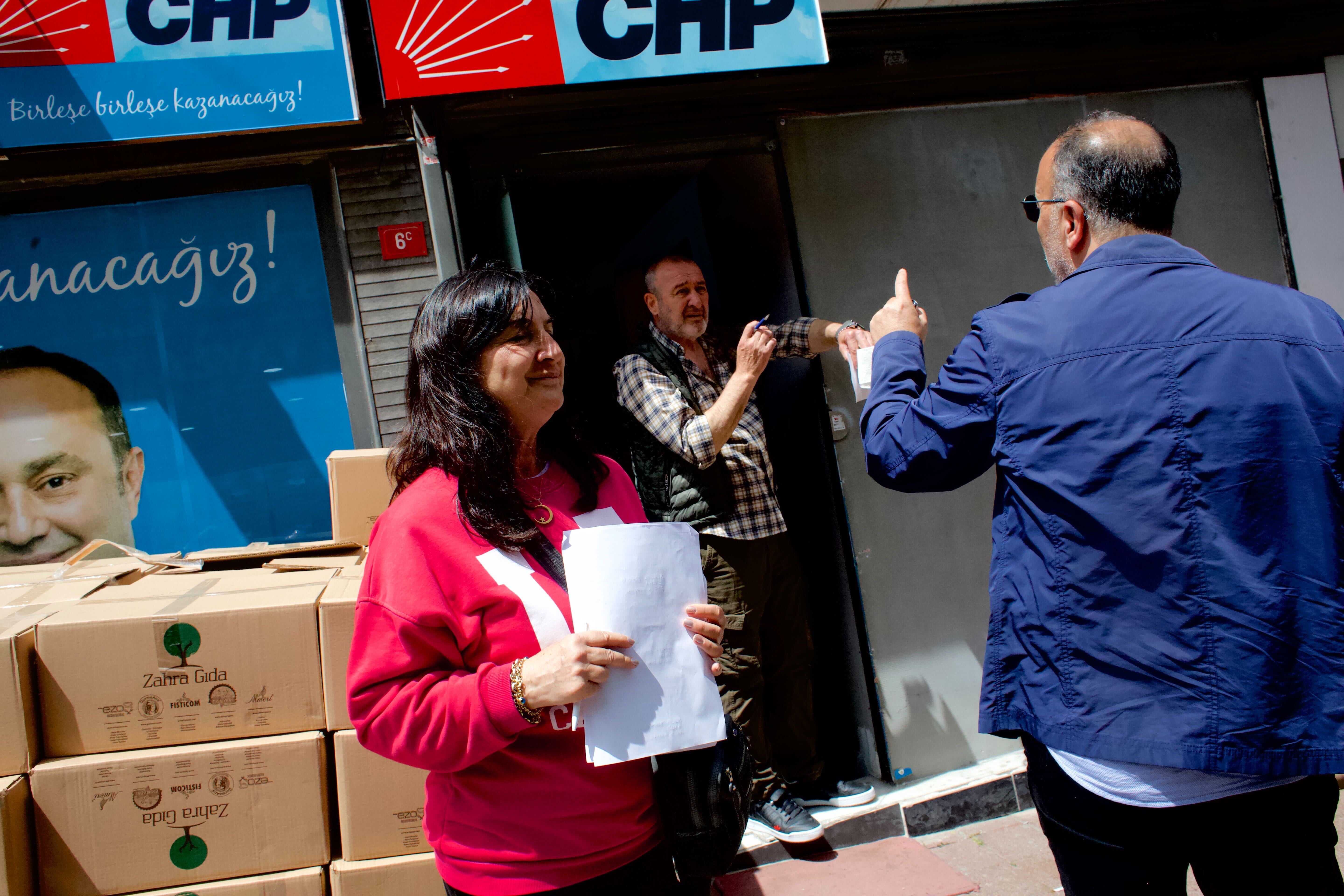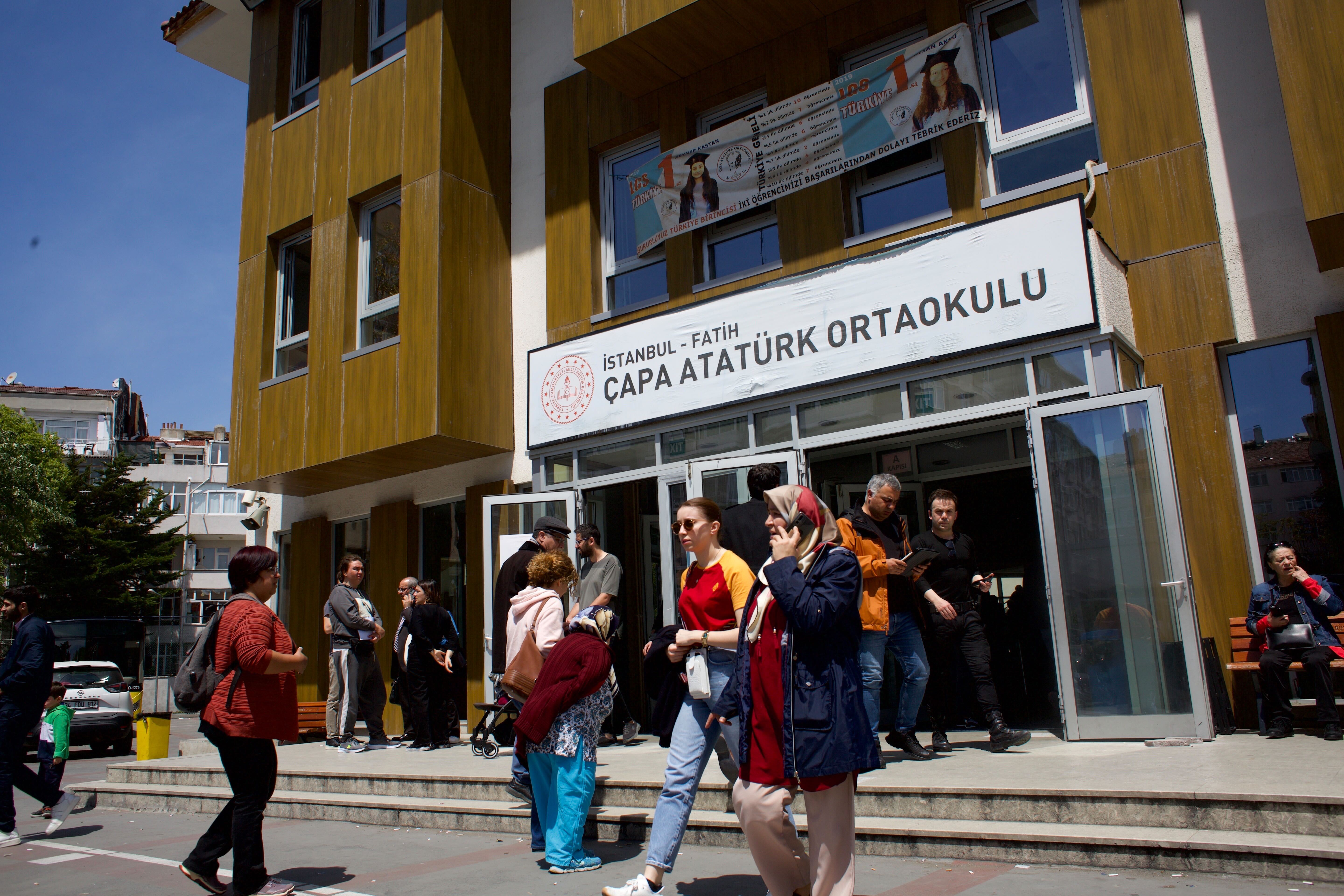Erdogan gains upper hand in scramble to keep power as Turkey’s presidential election to be decided by run-off
Recep Tayyip Erdogan’s beats opposition candidate comfortably in first round of voting – but falls short of outright win
The battle for Turkey’s presidency will be decided by a run-off in two weeks, with president Recep Tayyip Erdogan comfortably beating his chief rival but failing to pass the 50 per cent threshold required to win outright.
Seeking to extend his 20 years in power, pre-election polls had suggested that Mr Erdogan looked vulnerable against an unusually broad-based six-party opposition united behind rival Kemal Kılıcdaroglu – who were seeking to capitalise on voter anger at the country’s economic crisis and the authoritarian turn the nation has taken in recent years as Mr Erdogan has cemented his control.
In what has been seen as the most important election in Turkey’s recent history, Mr Kılıcdaroglu – who held a poll lead going into voting day – and his coalition will have to pick themselves up after a bitterly disappointing result. Mr Kilicdaroglu tweeted around the time the run-off was announced: "Don't lose hope.... We will get up and win this election together."
The country’s Supreme Electoral Board, said that Mr Erdogan won 49.51 per cent of the vote, while Mr Kılıcdaroglu won 44.88 per cent. He added that even when the remaining 35,874 uncounted overseas votes were distributed, no one would secure the majority needed to avoid the run-off.
Mr Erdogan’s Justice and Development party (AKP) and its nationalist allies were also said to be close to gaining a parliamentary majority in parallel elections. Preliminary results suggesting they had sucured 321 seats in the 600-seat National Assembly, while the opposition, led by Mr Kılıcdaroglu’s Republican People's Party (CHP) won 213. The 66 remaining are set to go to a pro-Kurdish alliance.
Mr Kılıcdaroglu has pledged to revive parliamentary democracy after years of state repression, deal with sky-high inflation, return autonomy to institutions that have been sidelined by Mr Erdogan’s presidency and rebuild frail ties with the West.
The task facing Mr Kılıcdaroglu in the second round of the presidential vote is complicated by the 5.17 per cent gathered by ultranationalist candidate Sinan Ogan in the first vote. Mr Ogan could play a "kingmaker" role in the run-off if he decides to endorse one of Mr Erdogan or Mr Kılıcdaroglu. However, support from Kurdish voters for Mr Kılıcdaroglu’s alliance makes that prospect look remote.
Mr Ogan has said that his goal is to remove two mainly Kurdish parties from the “political equation” and bolster nationalists and secularists. So, he could only support Mr Kılıcdaroglu in the run-off if he agreed to offer no concessions to pro-Kurdish parties. “We will consult with our voter base for our decision in the runoff,” the nationalist told Reuters,
It is a tough ask, according to Emre Peker, of the Eurasia Group consultancy. “Heading into the run-off, [Mr] Erdogan will have an easier time than [Mr] Kilicdaroglu wooing voters and securing [a] strong turnout... Five more years of Erdogan is now even more likely,” he tweeted.
Pro-government media cheered the outcome of the presidential vote, with the Yeni Safak newspaper proclaiming "The people won", referring to Mr Erdogan's People's Alliance that appeared to have won a majority in parliament, potentially giving him a crucial edge in the presidential runoff. Both Mr Erdogan’s Justice and Development Party (AKP) and the People’s Republican Party (CHP) clashed over coverage of the ballot count as it came in, a sign of how fractious this contest has become.
"The winner has undoubtedly been our country," Mr Erdogan said in a speech to cheering supporters at the headquarters of his party in the capital Ankara overnight. The mood at the opposition party's headquarters had been subdued in the early hours as the votes were counted.

Voters cited concerns about the economy, which has been on a downward spiral for years, as the primary issue driving their votes. As news of a run-off solidified, Turkish stocks tumbled on Monday morning. The lira held near a two-month low, sovereign dollar bonds fell and the cost of insuring exposure to the country's debt spiked.
“Without democracy and freedom, you can’t have any economy,” said 74-year-old Nil Adula On Sunday, as he prepared to vote in central İstanbul. “The most important thing is that the justice system is working properly.”

The elections are being intently watched by Western nations, the Middle East, Nato and Moscow, as the united opposition try to dislodge a leader who has concentrated nearly all state powers in his hands and worked to wield more influence on the world stage.
Mr Erdogan, along with the United Nations, helped mediate a deal with Ukraine and Russia that allowed Ukrainian grain to reach the rest of the world from Black Sea ports despite Russia’s war in Ukraine. The agreement is set to expire in days, and Turkey hosted talks last week to keep it alive.
However, Mr Erdogan also has held up Sweden’s quest to join Nato and has been a difficult partner for the West at times, not being afraid to talk tough or dig his heels in. As one of President Vladimir Putin’s most important allies, a defeat would unnerve the Kremlin, while the president has also clashed with a number of Middle East leaders.
The outcome was always likely to hinge on slivers of swing voters that include ethnic Kurds – who have voted for either the AKP or leftist parties traditionally – Turkish nationalists, and at least 5 million first-time voters. Mr Erdogan struggled to connect with Generation Z voters ahead of the vote, who appeared unmoved by his appeals to conservative and Islamic values.
“I see voting as a tool to change and influence the government from within,” said Idris Sinan, an 18-year-old high school student and first-time voter, as he emerged from a polling station.

“We have been ruled by this party, the AKP, for 20 years... our country [has] become poor and more lawless,” he added.
Mr Erdogan seems to have rallied enough of his hardcore support swayed by those values. Maximising the vote from this group will be important in the run-off.
Many voters said they were convinced by Mr Erdogan’s nationalist stance that the president said would prioritise Turkey’s security. That also Included attempts to associate the opposition with the West and the Kurdistan Workers Party (PKK), an outlawed separatist group that the US and EU label a terrorist organisation.
“We are not for America. We are not for the PKK,” said Faruk Baba, a 67-year-old clothing shop proprietor in the Fatih district of Istanbul.
When reminded that the Taliban of Afghanistan had endorsed Mr Erdogan he replied: “The Taliban are Muslims. We are Muslims.”
Among AKP supporters, many cited conspiracy theories spouted by Mr Erdogan in previous weeks that the opposition are a proxy for Western powers.
“Erdogan has stood strong for us,” Ziya Uztok, a 73-year-old in Uskudar. “Kilicdaroglu is an American project.”
“I accept Kilicdaroglu as a fellow citizen, but I would not vote for him,” he said.

For the opposition, they need to maximise votes from the more swing elements and the Kurdish vote.
Mr Erdogan alienated ethnic Kurds, who used to vote for him in large numbers but – in a historic shift – embraced the secular centre-left candidacy of Mr Kilicdaroglu. “The election for us is about democracy and cultural and political rights,” said Mehmet Uzum, a 52-year-old Kurdish businessman in the Sultanbeyli district of Istanbul.
He said that Mr Erdogan and the AKP became toxic to Kurds since they partnered with the nationalist National Movement Party (MHP), who appear to have helped Mr Erdogan’s alliance push for a parliamentary majority.
“We had a lot of friends who were AKP but then they switched to CHP because of the economy and all the religious talk,” said his daughter, Gizem, 22.
In a bid to secure support from citizens hit hard by inflation, Mr Erdogan increased wages and pensions and subsidised electricity and gas bills in the days ahead of the vote, while showcasing Turkey's homegrown defence and infrastructure projects.
On a side street in Fatih, CHP organisers had been upbeat on Sunday as they amassed meals to hand their volunteers throughout the district.
“Before there were certain neighbourhoods that we couldn’t go to campaign,” said Cigdem Gulduval, a local opposition party official. “Now they’re more receptive. They’re all paying high prices at the same butchers as we are. They’re all paying the same gas bills.”
Join our commenting forum
Join thought-provoking conversations, follow other Independent readers and see their replies
Comments


Bookmark popover
Removed from bookmarks